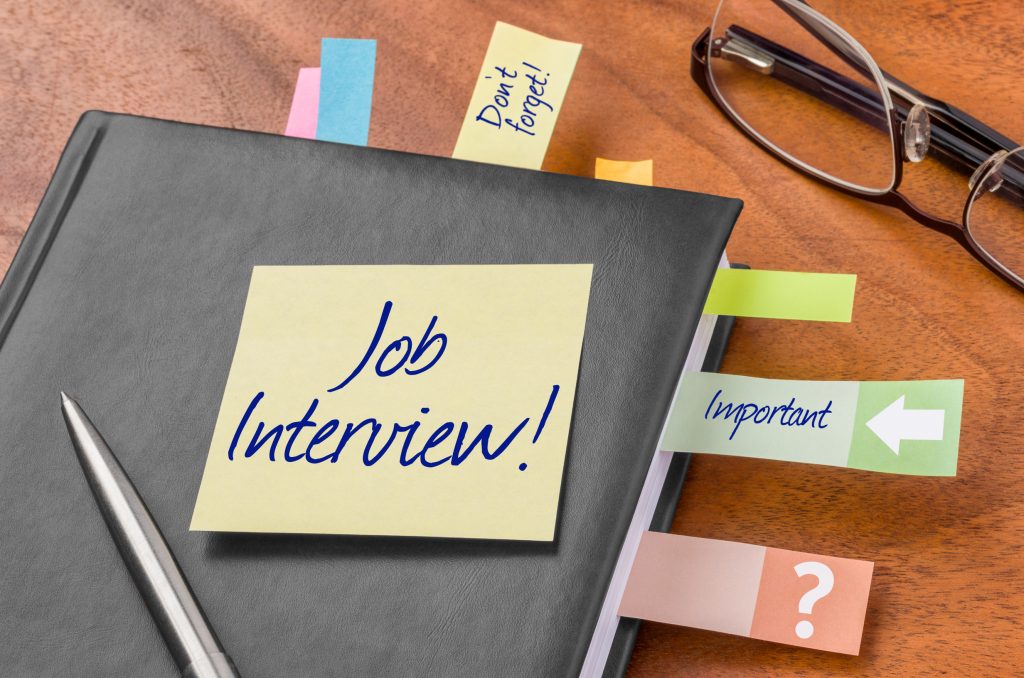Do you have an interview coming up? Don’t stress: prepare! Begin with these five common interview questions to practice before your interview. Use a mirror, use a friend, and craft some unique and personal answers to these difficult (and often vague) questions. For English learners, we have included the language needed to master these interview questions.

Five common interview questions
#1: Tell me a little about yourself
What they’re looking for: This is one of the typical questions to begin an interview. The interviewer is allowing you to “break the ice”: to warm up a little, speak about yourself and your background, and maybe include some of your interests.
Tips: Don’t speak too long . . . but don’t give a short answer either! Tell the interviewer where you are from, what you are doing in your city, and how long you’ve been there. You can also include a little about your academic and professional background.
Example language: It’s a good idea to learn some phrasal verbs and idioms that make your speech natural. Be sure you know how to communicate your past and your present situation.
- I was born in Berlin, but I grew up in Munich.
- I’m a fourth-generation Venezuelan living in Spain.
- I have a passion for design and I’m a huge anime fan, so I majored in Graphic Arts at college.
#2: What are your strengths and weaknesses?
What they’re looking for: How well can you describe what you’re good at (and what you’re not so good at)? In most cases, the interviewer is looking for honesty when speaking about your weaknesses and humility when speaking of your strengths.
Tips: This is one of those questions that is really difficult to answer, so be sure to think of your answers before your interview (and be honest)! Try to avoid cliche phrases like “I’m a hard worker.” This is boring and unoriginal.
Another tip? Don’t give a “weakness” that is actually a strength. This is called “humble bragging,” and it’s really annoying!
An example of a humble brag is this: “I would say that one of my faults is that I’m always early. I’m always the first one to arrive at work in the morning and to arrive at every meeting. It makes everyone else feel like they’re behind me.” That’s not speaking of a fault: it’s speaking of a part of your character and trying to make yourself sound impressive.
Example language: Language of speculation is used here: words such “I suppose” and “X could be considered” are useful.
- I suppose my greatest weakness is that I tend to take charge of group projects. I need to work on my teamwork a little and be more trusting of my colleagues.
- One of my strengths is my loyalty to my co-workers and my company.
#3: What was your favorite/least favorite thing about your last job?
What they’re looking for: An answer to this question helps the interviewer get a picture of your ideal workplace.
Useful tips: Don’t speak poorly about your former co-workers or boss, but be honest.
Example language:
- I loved my old job, but I was unhappy with the hours I worked. I would prefer a more set schedule and more weekends off.
- The best thing about my last job was that they trained me very well. I felt very prepared on my first day.
#4: Where do you see yourself in five years?
What they’re looking for: Are you a person who has personal and professional goals and a clear vision? If so, then you can easily speak of your plans for the next few years!
Useful tips: Be clear and specific. What do you aspire to, and how will you achieve these goals?
Example language:
- In the next five years, I definitely see myself . . .
- I’d love to . . . . in the next few years.
- I’ll most certainly . . .
#5: Why did you leave your last job?
What they’re looking for: Can you diplomatically explain why you chose to leave your last company? This is a skill necessary for competent and capable employees.
Useful tips: Sometimes you left for a logical reason: you moved, you got a new job offer, etc. Sometimes, it just wasn’t the right fit for you. Be honest, but don’t give too many details.
Example language:
- I loved my old job, but I didn’t see much ability for advancement in my position.
- I left my position because I moved here.

#5: Do you have any questions for me?
What they’re looking for: Did you do your research about the company? This is your chance to show this!
Useful tips: Do some research ahead of time, and come to the interview prepared.
Example language:
- I do! On your website I saw . . .
- I certainly do. I was wondering if . . .
- Sure! Could you please explain . . .
CISL’s Career English students work closely with the Career English Coordinator to find the host company that meets their professional goals. Students also work with the Career English Coordinator to prepare for their interview, which all students must complete before being accepted to a host company.
What’s life like as a Career English student? Hear from a program graduate!
CISL Career English Program from Converse International School on Vimeo.
For more information on how to enroll in CISL’s Career English program and gain experience with an American company, contact CISL.

